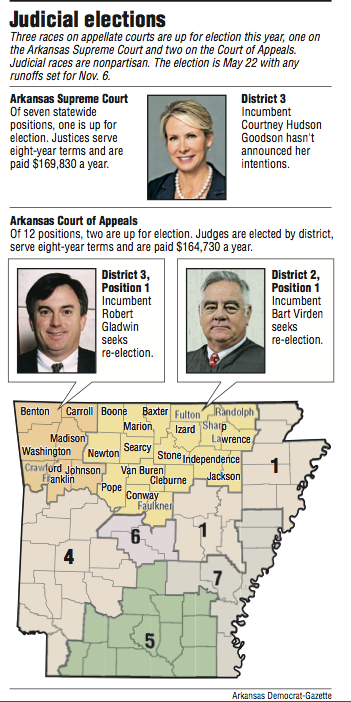As attention starts to shift to this year's November elections, perhaps not on people's radar are three appellate judge positions that will be on the ballot in May.
The filing period for the judicial races is a month away, and, so far, few candidates have expressed interest in running.
The highest judicial position to be decided this spring is the Arkansas Supreme Court seat held by Justice Courtney Hudson Goodson, who has been mum about her re-election intentions. The court has seven members elected statewide, and Goodson is the only justice up for re-election this year.
Goodson, who was first elected as a justice in 2010, has not reported raising any money after her failed 2016 bid for the high court's open chief justice position. She did not respond to repeated requests for an interview that were left with her office and with a former political consultant.
The current chief justice, Dan Kemp, defeated Goodson in last year's race with 58 percent of the vote. Because she already held a position on the court, she has continued to serve her eight-year term.
No one has announced plans to run for Goodson's seat, which is Position 3 on the court.
David Sterling, who ran for attorney general in 2014 and lost the Republican nomination to now Attorney General Leslie Rutledge, has been floated as a possible candidate for the Position 3 high court seat. But, when asked about his intentions to enter the race, he declined to comment.
In recent history, people considering entering judicial races tended to announce their intentions closer to the filing deadline. Judicial races are officially nonpartisan, and there are no primaries.
In 2016 -- when the partisan primary and judicial elections were held in March to coincide with other states' presidential primaries -- Goodson and Kemp announced their intentions in the final two months leading up to the fall filing deadline.
In 2014, the first candidate for a Supreme Court seat announced race intentions about a year before the May election, while the last candidate to enter the race announced just before the February filing period.
The filing period for this year's judicial and partisan elections is from Feb. 22 to March 1. The judicial elections are May 22, which also is the day of party primary elections.
Several observers said potential candidates may be waiting to see what Goodson does. Also, the nature of several recent Supreme Court races -- characterized by out-of-state spending on negative ads -- could be giving potential candidates pause.
"Lots of people don't like being in hotly contested elections," said Joshua Silverstein, a law professor at the University of Arkansas at Little Rock's William H. Bowen School of Law. "When it's something like the judiciary, where there's a history of not being so nasty, [more recent negative campaigns] might be dissuading some people."
During her 2016 race against Kemp, Goodson was the target of more than $600,000 in attack ads by Judicial Crisis Network, which did not disclose its donors. Such "dark money" was also directed at Tim Cullen, a Little Rock attorney who lost his 2014 bid for the Supreme Court to current Justice Robin Wynne.
Goodson was also featured heavily in a 2016 investigation by the Arkansas Democrat-Gazette titled "Cash & The Court," which highlighted more than $100,000 in campaign contributions from six class-action law firms with ties to her husband, John Goodson. Five other justices at the time received money from class-action firms, the investigation found. Unlike dark money sources, the contributors to Goodson's campaign were listed on campaign finance reports available to the public.
The newspaper investigation found that the high court often sided with class-action lawyers who worked with John Goodson. Courtney Goodson recused herself in cases that directly involved her husband, as required by law.
While on the court, Goodson has been at the center of several high-profile cases. In June 2016, she wrote the majority opinion in the court's decision to uphold Arkansas' method-of-execution law. Earlier this year, she sided with the majority in a case that outlawed the practice of lawmakers directing state surplus money toward pet projects.
Goodson was also one of four justices investigated -- and ultimately cleared of wrongdoing -- after complaints accusing the judges of intentionally delaying their decision in a gay-marriage case until after the U.S. Supreme Court declared gay marriage legal in 2015.
She did not participate in the high court's precedent-setting decision last week to reaffirm state immunity from lawsuits. Goodson recused from the case, which involved the University of Arkansas system board of trustees, of which her husband is a member.
Meanwhile, two incumbents are up for election on the 12-member Arkansas Court of Appeals.
Judges Bart Virden -- who represents District 2, Position 1 in north-central Arkansas -- and Robert Gladwin -- representing District 3, Position 1 in Northwest Arkansas -- told the Democrat-Gazette in December that they plan to run for re-election. Neither said they know of anyone challenging them at this point.
Gladwin said he has set up a committee to begin fundraising and plans to emphasize his experience during his campaign. "I'm a two-term incumbent and a judge for 32 years," he said.
According to the most recently available campaign finance reports, Gladwin has $3,500 in his campaign coffers.
Virden said he plans to start fundraising this week or next week.
"I've done by best to be fair," Virden said of what he will emphasize in his campaign. "I enjoy it. I think I'm good at it."
Judges on the Supreme Court and Court of Appeals are elected to eight-year terms. Appellate judges earn $164,730 a year and Supreme Court justices earn $169,830.
Metro on 01/21/2018
